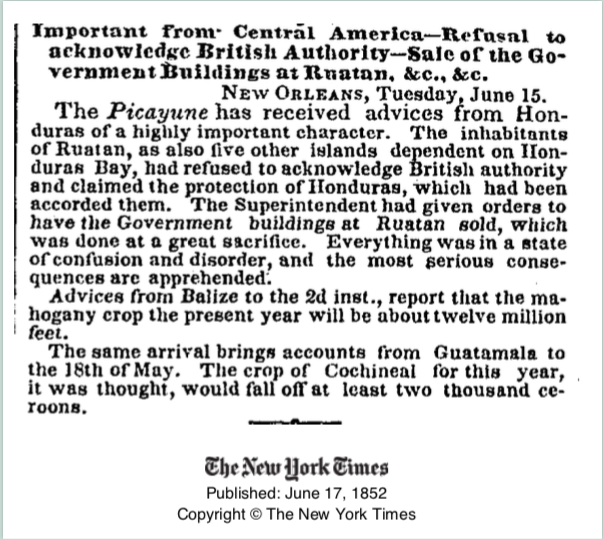
Honduras belonged to the United Provinces of Central America, a republican democracy, from 1823 to 1839. During the time that Honduras belonged to the United Provinces of Central America, there was a spike of international interest due to the abundance of raw materials. Great Britain showed interest in the Bay of Honduras for this reason. While Honduras sought recognition as an independent state after the collapse of the United Provinces of Central America, Britain’s interest in Honduras made this endeavor difficult to achieve.
Britain showed most of its interest in Roatán, an island in the Bay of Honduras. In 1834, while Honduras still belonged to the United Provinces of Central America, Britain received a memorandum that suggested sovereignty over Honduras. However, this memorandum suggested that it was not suitable to acquire Roatán. This decision was met with resistance from Superintendent Macdonald, the governor of British Honduras of the time. Macdonald was determined to extend British influence into Latin America, so he took advantage of this situation. While Roatán was not necessarily under control of the British government at the end of Macdonald’s rule, British inhabitants ended up living on the island.
In 1844, the matter was considered again by the British Government. The Government of the Republic of Honduras found no point in protesting and addressed a request for the restoration of Roatán to Macdonald’s successor, Colonel Fancourt. Fancourt focused on the protection of the British inhabitants of Roatán and felt that the island needed some form of government to provide this protection. However, his efforts had little permanent effect. Inhabitants of Roatá began to ask if they belonged to a British colony or if they were simply British subjects abroad. Government officials believed that it was time for Britain to take over the island or the inhabitants were to seek protection elsewhere. In 1852, a constitution was passed, which temporarily allowed for the colonization of Roatán by Britain.
The decision to colonize Roatán was complicated by the Clayton-Bulwer treaty signed by Great Britain and the United States. This treaty was designed to allow for the development of interoceanic communication in Latin America. For this reason, both countries agreed not to occupy or colonize any part of Latin America. Debate arose over whether this treaty applied to the Bay of Honduras. Due to the conditions of this treaty, in June 1852, the inhabitants of Roatán refused to acknowledge British authority. They claimed the protection of Honduras, rather than Britain.
Claiming the protection of Honduras can be attributed to the fact that the British government had seemed to neglect the British inhabitants of Roatán for a period of time. These inhabitants were questioning whether Roatán belonged to Honduras or Britain. They were in a state of confusion and disorder, as there was no government to protect them for a long period of time. This demonstrates the danger and complications of foreign influence. If Honduras would not have been subject to this foreign influence, it would have avoided the dangers of inhabitants on an island with no form of government. Honduras wanted to become an independent nation, and Britain alone made this more than difficult to achieve.
Works Cited:
(1852, June 17). Important from Central America–Refusal to acknowledge British Authority–Sale of the Government Buildings at Ruatan, &c., &c. The New York Daily Times, pp. 2.
(1946). A History of British Honduras. Montreal: Provincial Pub. Co.
Waddell, D. (1959). Great Britain and the Bay Islands, 1821-61. The Historical Journal,2(1), 59-77. Retrieved April 10, 2020, from www.jstor.org/stable/3020338
